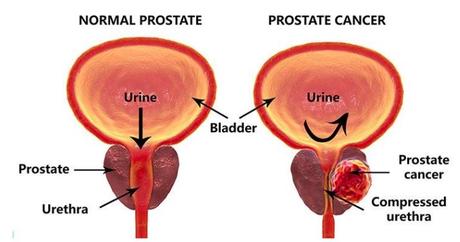In this article, Dr. Sumanta Mishra, a Premium Urologist in Bhubaneswar talks about “What is Prostate Cancer and what are the Symptoms, Causes, and Risks involved in it?”
Dr. Sumanta Mishra is a board-certified urologist who specializes in all endourological procedures, including prostate surgery, stone disease, laparoscopic kidney surgery, uro-oncology, gynecological urology, pediatric urology, and male sexual health. He is particularly interested in kidney transplantation.
Prostate cancer is a form of cancer that affects the male reproductive organ, or prostate.. In males, the prostate is a small walnut-shaped gland that generates seminal fluid, which is responsible for nourishing and transporting sperm.
Prostate cancer is one of the most frequent types of cancer, accounting for about 5% of all cases. Many prostate cancers are slow-growing and restricted to the prostate gland, where they are unlikely to cause substantial harm if detected early. On the other hand, while some types of prostate cancer develop slowly and may require little or no therapy, others are aggressive and can spread quickly.
Early detection of prostate cancer, while the cancer is still contained within the prostate gland, provides the highest opportunity for a favorable treatment outcome.

Symptoms
Bhubaneswar-based Dr. Sumanta Mishra a top Urologist notes that In its early stages, prostate cancer may not manifest itself with any signs or symptoms.
Prostate cancer that has progressed further may manifest itself with signs and symptoms such as:
- Having difficulty urinating
- The force of pee in the stream has been reduced.
- There is blood in the pee.
- The presence of blood in the sperm
- Bone pain is a common complaint.
- Losing weight without putting in any effort
- Erectile dysfunction is a medical condition that affects the ability to have an erection.
Causes
It is yet unknown what causes prostate cancer.
Doctors are aware that prostate cancer originates when cells in the prostate undergo genetic alterations that cause them to divide abnormally. The DNA of a cell includes the instructions that inform the cell what to do in order to survive.
The modifications instruct the cells to grow and divide at a faster rate than regular cells do. When other cells would have died, the aberrant ones would have continued to live.
The accumulation of aberrant cells results in the formation of a tumor, which can spread and infiltrate adjacent tissue. After some time has passed, some aberrant cells may break away and spread to other places of the body (metastasize).
Factors that increase risk
The following are some of the factors that can raise your risk of prostate cancer:
Old Age
As you grow older, your chances of developing prostate cancer increase. It is particularly common in people over the age of 50.
Race
For unknown reasons, Black men have a higher risk of prostate cancer than those of other races, according to research. Prostate cancer is more likely to be aggressive or progressed in African-American men than in white men.
Ancestors and forefathers
If you have a blood relative who has been diagnosed with prostate cancer, such as a parent, brother, or kid, your risk of developing the disease may be higher. You may also be at increased risk for prostate cancer if you have a family history of genes that raise the risk of breast cancer
Obesity
Individuals who are overweight or obese may have an increased risk of prostate cancer when compared to those who are regarded to be of a healthy weight, while research has produced conflicting results. The cancer is more likely to be more aggressive in obese persons, and it is also more likely to recur after early therapy says Dr. Sumanta Mishra a top Urologist in Bhubaneswar.
Complications
The following are some of the side effects of prostate cancer and its treatment:
Cancer that spreads (metastasizes)
In addition, prostate cancer can spread to neighboring organs such as the bladder, as well as through the circulation or lymphatic system to the bones and other organs of the body. In some cases, prostate cancer that has migrated to the bones can cause pain and fractures. Once prostate cancer has spread to other parts of the body, it may still react to treatment and may even be managed, but it is unlikely to be cured at this point in time.
Incontinence
Urinary incontinence can occur as a result of prostate cancer and the therapy for it. Continence treatment is determined by the type of incontinence you have, the severity of your condition, and the chance that it will improve over time. Medication, catheterization, and surgery are all possible treatment options.
Erectile dysfunction
In men with prostate cancer or those who have received treatment for the disease, including surgery, radiation, or hormone therapy therapies, erectile dysfunction can occur. Erectile dysfunction can be treated with medications, vacuum devices that aid in achieving an erection, and surgery, among other options, notes Dr. Sumanta Mishra one of the best Urologists in Bhubaneswar.

**All the information provided in the content belongs to the writer. Never do Self-diagnosis & self-treatment of any medical condition**
Also Read
BOTOX Injection: Treatment for wrinkles & Anti-aging
What is Knee Arthroscopy and what is the treatment for it?
7 reasons Why You Should Consult a Gynaecologist
**SP**
